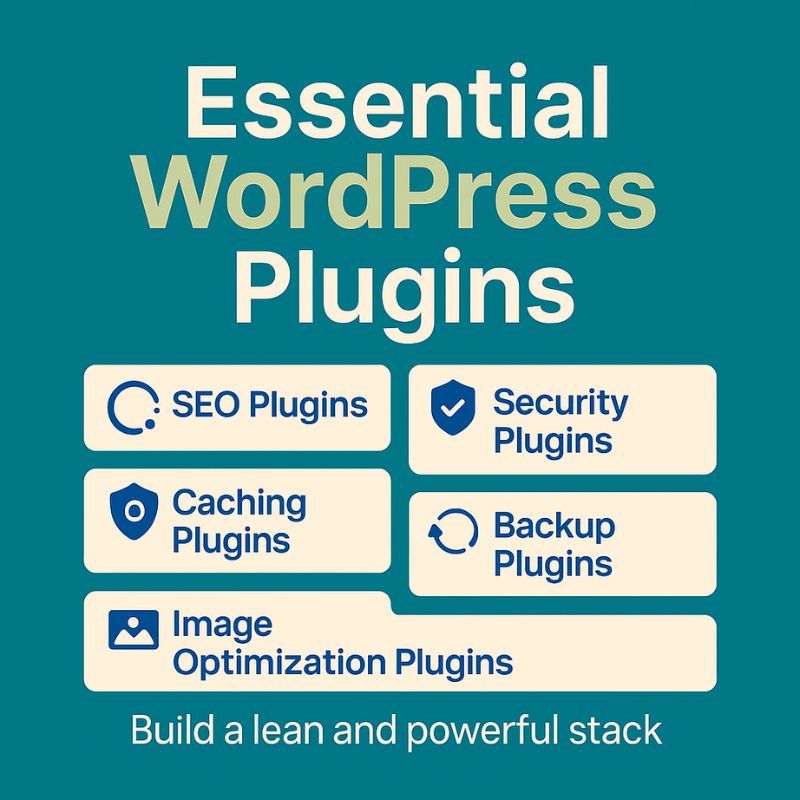Essential Plugins Only: A Lean Stack

Essential WordPress Plugins: Build a Lean and Powerful Stack
WordPress powers millions of websites worldwide. However, many beginners install too many plugins without realizing the risks. While plugins add features, they can also slow down your site, create conflicts, and weaken security. Therefore, building your website with only a few Essential WordPress Plugins keeps your stack lean, efficient, and secure. In this guide, you’ll discover which plugins you really need and how to use them without overloading your site.
Why a Lean WordPress Stack Matters
A lean WordPress stack always results in better performance. In fact, fewer plugins mean fewer vulnerabilities and faster loading times. Moreover, it ensures your website remains stable across updates. Although the WordPress.org repository offers more than 60,000 plugins, not all of them are useful for your site. Consequently, focusing only on the must-have plugins is the best way to balance functionality and speed.
SEO Plugins: Optimize Content with Essential WordPress Plugins
Search Engine Optimization is critical for traffic growth. For example, plugins like Yoast SEO or Rank Math help optimize metadata, titles, and internal linking. In addition, they provide content analysis and readability checks. As a result, your blog posts—such as Google Chrome Guide 2025 or Firefox Browser Guide 2025—can achieve higher visibility in search engines.
Caching Plugins for Faster WordPress Speed
Website speed influences both SEO and user experience. Therefore, caching plugins like WP Rocket or W3 Total Cache are indispensable. They store static versions of your pages and deliver them instantly. Consequently, your website loads faster, which is crucial for content-heavy posts such as Microsoft Edge 2025 or Opera Browser 2025. Moreover, caching reduces server stress, making your site more reliable.
Security Plugins to Protect Your Site
Security should never be ignored. Plugins like Wordfence and iThemes Security block brute-force attacks, scan for malware, and send alerts about suspicious activity. On the other hand, running a site without security plugins increases your risk of hacks. According to the WordPress Hardening Guide, security plugins are considered must-have WordPress tools for every site owner.
Backup Plugins: Keep Your Website Safe
Even well-protected sites can fail. Thus, backup plugins like UpdraftPlus or BackupBuddy are essential. They allow automated backups to Google Drive, Dropbox, or your server. As a result, you can restore your site quickly after a crash. Without backups, you risk losing everything. Finally, backups provide peace of mind for every WordPress user.
Image Optimization Plugins for Performance
Images improve design but often slow websites. Therefore, optimization is necessary. Plugins like Smush or ShortPixel compress images without quality loss. Moreover, next-gen formats like WebP reduce file sizes significantly. For instance, in posts like Chrome vs Brave, optimized images ensure faster loading and better engagement.
Spam Protection Plugins for WordPress
Spam comments clutter your website and hurt credibility. Fortunately, Akismet automatically filters out spam. Consequently, your comments remain clean and professional. In addition, preventing spammy links helps protect your SEO rankings.
Form Plugins to Capture Leads Easily
Forms are vital for interaction. For example, WPForms and Contact Form 7 let you build contact and survey forms easily. In addition, they integrate with marketing tools, which improves lead generation. As a result, these plugins enhance communication and business growth.
Analytics Plugins to Track Growth
Tracking user behavior helps you improve content. Google Site Kit is an excellent option because it integrates Analytics, Search Console, and PageSpeed Insights directly into your dashboard. Consequently, you can evaluate performance and refine your strategy. For example, when applying tips from Start a WordPress Blog or WordPress Browser Plugins, analytics data helps measure results more effectively.
Fewer Plugins, Better WordPress Performance
Every plugin adds extra code. Therefore, too many plugins may slow your site or cause conflicts. In other words, a lean stack is always better. By using a limited set of essential plugins—SEO, caching, security, backup, and image optimization—you maintain both speed and stability.
Final Thoughts: Building with Essential WordPress Plugins
In conclusion, choosing wisely makes all the difference. By focusing only on Essential WordPress Plugins, you ensure your site stays fast, secure, and reliable. Moreover, linking to related posts such as Opera Browser 2025 or Chrome vs Brave improves SEO and engagement. Above all, always update your plugins regularly and monitor site performance with GTMetrix or Pingdom. As a result, your WordPress site will remain optimized and future-ready.
